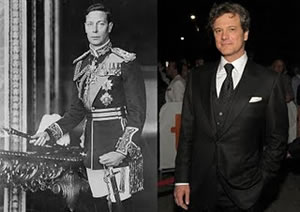Although Firth's new film gives therapist credit there was another man who helped George VI with his speech
|
Chiswick actor Colin Firth has begun filming The King's Speech in which he plays Queen Elizabeth's father, King George VI.
The film tells the poignant and uplifting true story of the unorthodox relationship between England's reluctant King George VI, plagued by a nervous stammer, and the irreverent Australian speech therapist Lionel Logue who cures him.
Although Logue is given the credit, there was another man who was instrumental in helping King George VI with his speech.
"My father, David Martin, worked for the BBC all his life, ending his career at the BBC film studios in Ealing," explains Chiswick resident Jane Martin.
"Back in 1941 he was working in radio, and that had year to the King (George VI) to speak to the country, which was then in a state of despair, in his annual Christmas Day broadcast."
In a letter to his grandchildren, David wrote "Unfortunately, the King had a very bad stutter, and his nervousness on 25th December 1941 was only too apparent. We recorded the speech because it was due to be broadcast at intervals throughout the world, and it was my job to look after the broadcasts over the next 18 hours or so. If we had broadcast the speech just as the King had delivered it, it would have given a very bad impression of what things were like in the Mother Country, as it was called.
"Soon after the live broadcast from Sandringham on Christmas Day, an instruction was passed down the line that the speech was to be ‘doctored’ to make it sound good. The instruction eventually landed in my lap, and I was told later on that the message had come direct from the Prime Minister, Winston Churchill.
"We didn’t have tape in those days and all recordings were made on metal discs which made the whole exercise rather tricky. It all went well and the final result sounded pretty good, and no one would have known that the King had a stutter, for I was able to cut all the stuttering out, and to close up all the pauses that came at the wrong places.
"I didn’t go to bed for 24 hours. I was 19 years old at the time. I also learned later that the Queen was at the King’s side trying to encourage him, and to help him get over his stutters when he made the live broadcast at 3.00p.m. It is difficult to explain how the job was done, but perhaps it helps if I say that I had six turntables and two recordings of the speech, and went from one to the other to close up the gaps. The speech was on four discs, so I had eight discs altogether.
David ended the letter by saying, "I don’t think that this story has even been written about since then, so in a way I am giving you privileged information. How wise of the Prime Minister to have given his instruction at that time in our history!"
As the second son of George V, Prince Albert "Bertie" was not expected to ascend to the throne, but when his brother Edward chose to abdicate to marry Wallis Simpson, Bertie was his successor and in 1936 he became King George VI.
Thrust into the international spotlight, he engaged Lionel Logue who helped him find a voice to lead the nation.
Colin Firth plays Prince Albert alongside fellow Chiswickian Michael Gambon as King George V.
The film's producer Iain Canning came across The King's Speech when it was an unproduced stage play by David Seider.
It is set to be released later this year.
January 25, 2010
